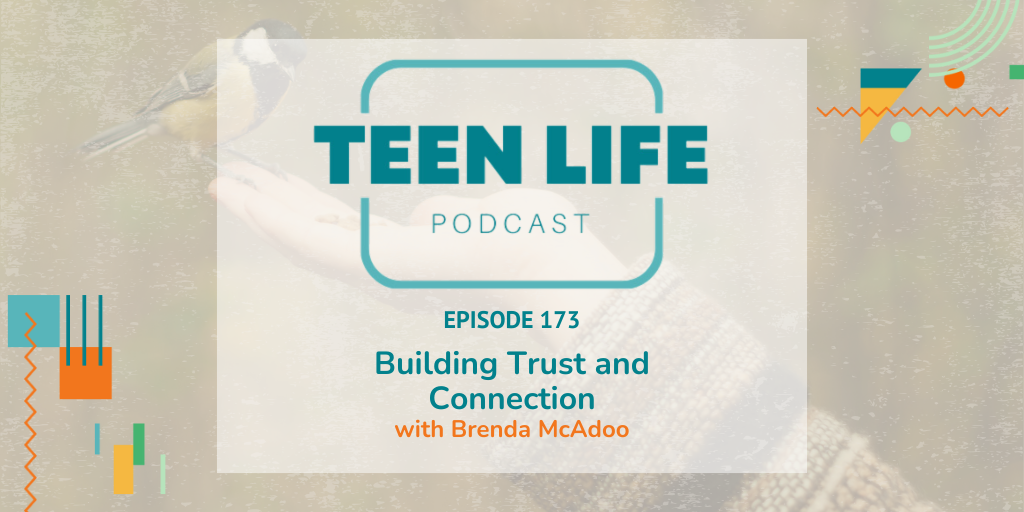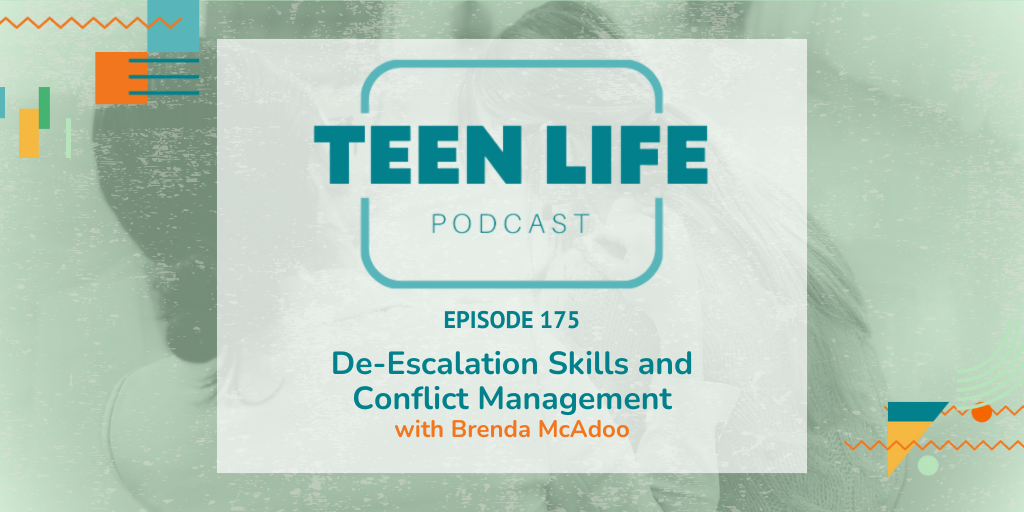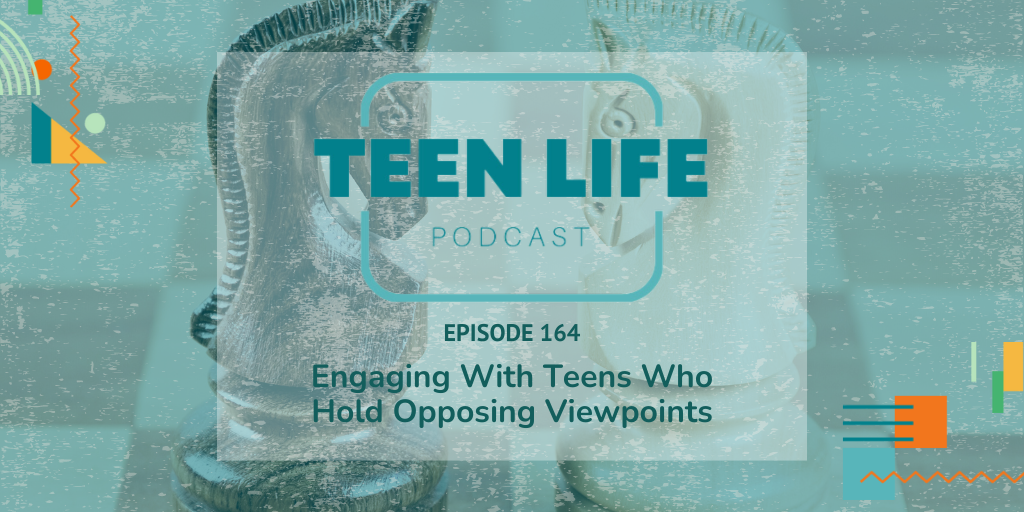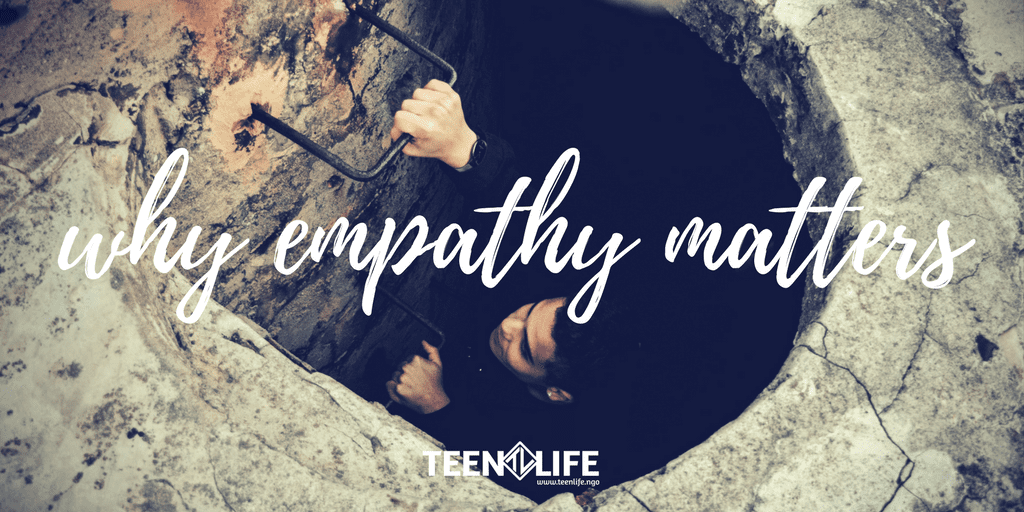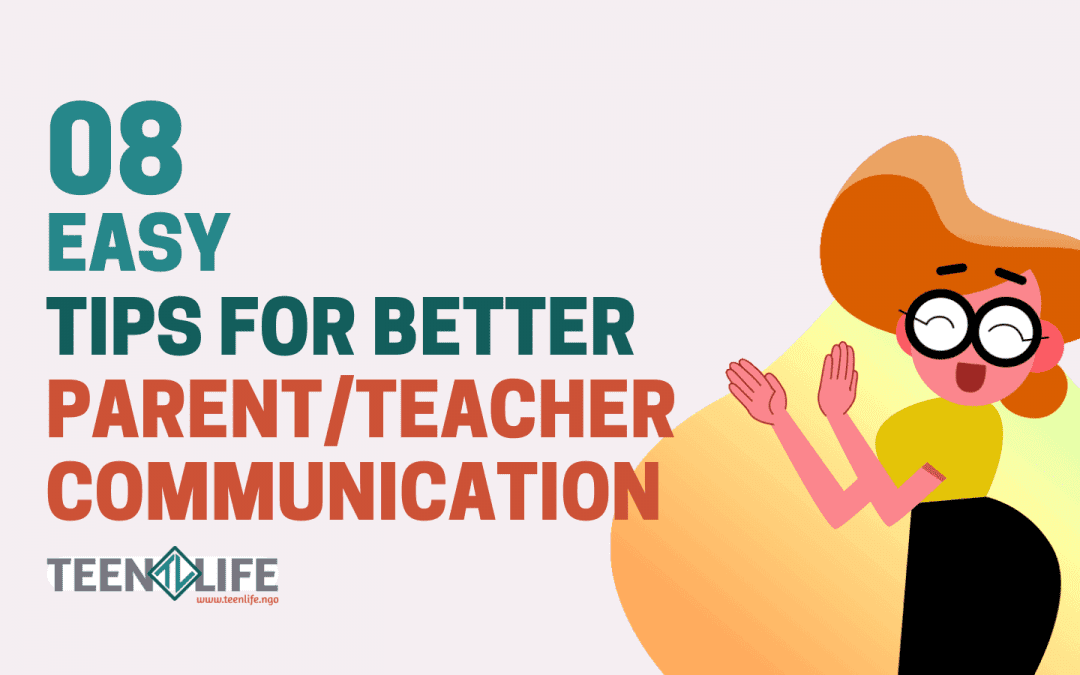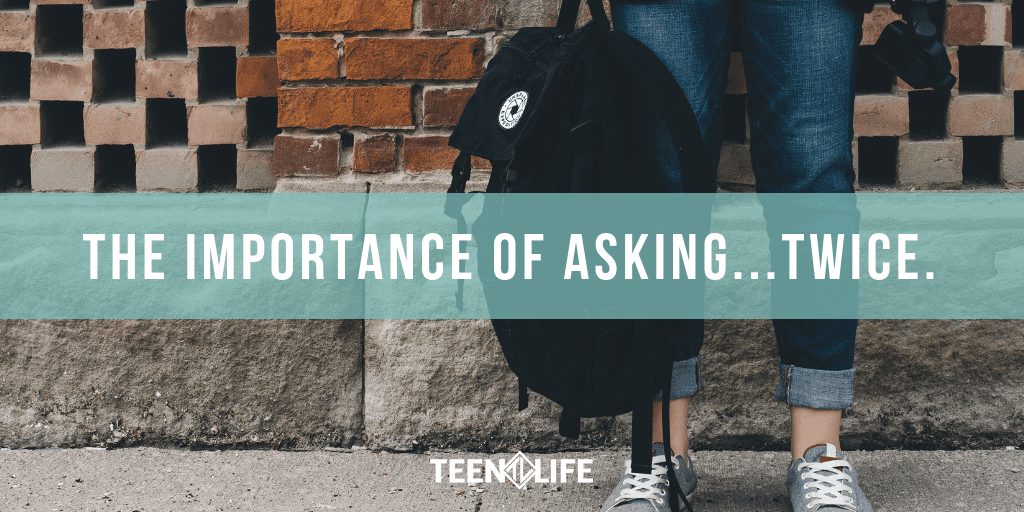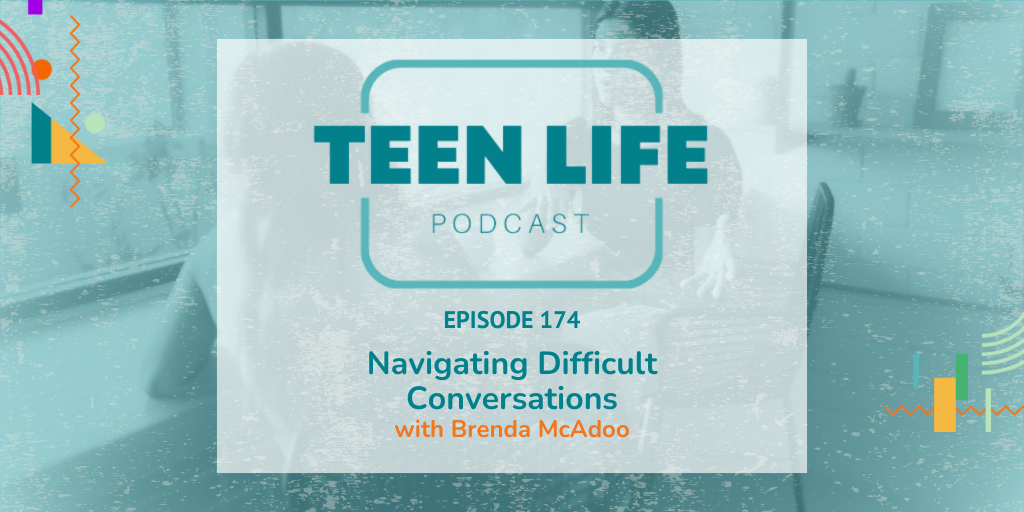
Navigating Difficult Conversations with Teens | Ep. 174
Podcast: Play in new window | Download
Anyone who lives or works with teens has to navigate difficult conversations eventually.
Have you ever found yourself in a conversation with a teen that suddenly turns defensive or shuts down? As caring adults, we want to keep the lines of communication open, but it’s not always easy.
We sit down with former FBI negotiator, mediator, and Abilene Christian University faculty member Brenda McAdoo to talk about navigating tough conversations with teens.
Brenda shares expert insights on keeping discussions open, recognizing emotional cues, and using de-escalation strategies that actually work.
Key Question
When a teen is resistant or defensive, how can we respond in a way that keeps that conversation open?
What We Cover
03:50 Listening for Emotions and Content
06:33 The Role of Emotions in Conversations
14:40 De-escalation Techniques for Teens
17:55 Teaching Conflict Resolution and Apologies
19:26 Asking Effective Questions in Tense Moments
23:01 Balancing Intervention and Independence
23:14 Shock Proofing and Emotional Regulation
Keeping Conversations Open with a Teen Who Is Resistant
When a teen becomes defensive, our goal isn’t to overpower their emotions but to ensure communication remains open.
Instead of trying to control their reactions, we should first regulate our own emotions. A calm presence can make all the difference in how a conversation unfolds.
It’s also crucial to make sure we’re having the right conversation.
Sometimes, what appears to be a discussion about pink hair is actually about a deeper issue—like the need to fit in. By listening carefully and waiting to hear what they truly want to talk about, we can avoid reacting too quickly to surface-level concerns.
Handling High-Emotion Moments
Teens can be dramatic when they’re worried, and their emotions often mask the true issue at hand. Instead of focusing on their words alone, we should listen for underlying feelings.
When emotions run high, rational thinking decreases, making it ineffective to try reasoning with them in that moment. Rather than pushing logic onto an emotional teen, we should first help them regulate their emotions. Only then can we return to a more productive conversation.
De-Escalation Strategies for Tense Moments
One of the most effective techniques for managing emotional reactions is the 90-second rule.
Dr. Jill Bolte Taylor discovered that when an emotional response is triggered, the brain releases neurochemicals that create physiological sensations—such as a racing heart or tense muscles. If we do nothing to feed the emotion, this chemical reaction naturally dissipates within 90 seconds. Any emotion that lingers beyond that point is being sustained by repeated thoughts about the triggering event.
Even in high-stakes situations—like Will Smith at the Oscars—taking 90 seconds before reacting can change everything.
If we extend this same grace to teenagers, we give them the space to make better decisions instead of letting emotions take control.
Preventing Escalation Before It Starts
Teaching conflict resolution tools ahead of time gives teens the skills they need to navigate tense situations more effectively. It’s important to remember that when emotions take over, teens don’t think about consequences the way adults do. Helping them learn how to manage emotions before jumping into logic can lead to better conversations and outcomes.
Asking Better Questions in Tense Moments
When emotions are high, the way we ask questions matters. Being honest and curious can encourage teens to open up.
Helping them step outside of their own perspective by asking, “How do you think that made them feel?” can shift their focus from defensiveness to reflection.
Similarly, inviting them to assess the atmosphere in the room—by asking, “What is the tension in the room doing to everyone?”—can create awareness without confrontation.
Sometimes, the best way to keep the conversation open is to change the subject. While this should be a last resort, shifting gears to a different topic can provide a needed break and prevent escalation. However, it’s important to ensure that we’re not dismissing their feelings in the process.
TL Tips & Takeaways:
Emotional Regulation
When dealing with teens, it’s crucial to recognize and help them manage their emotions. Give them 90 seconds to process intense feelings, avoid dismissing their emotions, and model healthy emotional responses.
Keep Conversations Open
Ask open-ended questions that help teens explore their underlying feelings and perspectives. Focus on understanding their motivations rather than immediately reacting or trying to correct their behavior.
Relational Equity Matters
Build trust and maintain a non-anxious presence with teens. This allows for more meaningful conversations and increases the likelihood that they’ll be receptive to guidance during difficult moments.
Some Last Thoughts
Have a question or a topic you’d love to hear about? Reach out on social media or email us at podcast@teenlife.ngo.
Read Episode Transcript
Karlie Duke 0:00
Music. Welcome to the teen life podcast, where we explore your questions to help you make meaningful connections with teenagers. Because no teen deserves to feel alone. We are back again with Brenda McAdoo and Nino’s with me here too, to have another excellent conversation. I mean, last week was incredible, and so yeah, I’m excited today we’re getting into navigating difficult conversations, which, with your experience in the FBI, I think we’re just going to have a lot of wisdom. So the first question that I want to kick off with is, when a teen is resistant or defensive? How can we respond in a way that keeps that conversation open?
Brenda McAdoo 0:45
I think this, the most important way to think about this is to concentrate on keeping the conversation open, not concentrating on them being defensive, right? Because we have to maintain our own emotions and regulate ourselves first. We can’t regulate anybody else’s emotions, but we can help people, and especially our teens, be able to navigate difficult conversations or just a hard space that they’re in, or hard time that they’re going through. So I think the to be able to keep conversations open, we have to make sure that we’re having the right conversation.
So I’ll give an example of this. So if you have a teenager who shows up in your space, it doesn’t matter if you’re the parent or just an adult in their lives that they love, and they say, I’m going to dye my hair pink. So you have two choices. You can say, not in this house, you’re not or you can say, What do you like about pink hair? Well, everybody has pink hair right now, so they’re putting this little stripped on one side and then the tips, or they give that well, and you know, kimmy’s mom said that she could have it. So as a parent, you can say, well, if you were Kimmy, then you could have pink hair. Or you could say, Well, do you want to do it because everybody else is because the next thing they say might be, I don’t want to feel like I don’t fit in, right? That’s the conversation we want to have, not about the pink hair. So, man, sometimes we cut off the conversation at the beginning, because we don’t know what conversation our kids want to have, and so as we’re thinking about keeping that conversation open, I think, we have to be willing to.
We talked about being shock-proof last week, but how do we wait to hear what they really want to talk about without reacting To the first thing they say?
Here’s something about teenagers that I’ve learned over the years is that they are dramatic, not all the time. They’re dramatic when they’re worried. So adults are like that too. We’re dramatic when we’re worried. So it comes out like this. You just don’t understand what my life is like, or I can’t trust anybody, so all of these things, or I’m going to run away, or I hate you, whatever it is, right? So that they throw something at you, and if you react to that thing, then you never find out what they’re worried about. So sometimes the big statements, right, that are often very dramatic are because they’re worried about something else.
And so if you’ll ask, you know, we call it drilling down, right? Drilling down, but without being confrontational. So you’re gonna ask a little bit more, and ask a little bit more so you can actually find out the conversation that they need to have with you. That’s a way to keep it open, right, and asking big, open questions,
Karlie Duke 3:44
right? It’s almost like even looking for those red flags, though, if you’re seeing emotion. I think sometimes, as parents or adults, it’s easy to put that on ourselves or try to shut that down, when really we should be going, Oh, hang on, there’s probably something more here that I need to dive into.
Nino Elliott 4:01
I like the phrase listening for a feeling versus the content, because, because oftentimes, and that was a great example, because I was not a pink hair guy, and, but everybody had the little, at least little strip and, but I interpreted big pink hair all over. And Elizabeth was like, No, just a strand, you know. And it’s like, oh well. And then there was the Kool Aid dye. But I erupted first before I really got to hear what she needed to experience and have, and the why of her.
Brenda McAdoo 4:34
I think as parents too, we have to be listening for emotion, like you said, because there’s something true about all of us is that when we’re really emotional, that our rational thinking goes down. So if you can think about you have a normal functioning level, and it is a straight line across a piece of paper, but when your emotion goes up above that line, your rational thinking goes below the line. And kind of imagine that. So that’s something that we need to recognize in our kids and ourselves at the same time, right? So when you know Elizabeth says, I’m going to dye my hair pink, you’re thinking all over and she’s going to be a pink poodle, right? Where she’s like, I want to put kool aid in this one strip of hair and try it out for a day or two days, however long it lasts. Yeah, but that if they’re so emotional about it because they think you’re not going to agree, because you’re going to be disappointed, because you’re going to be disgusted, because whatever, right all the things that’s in their head, or they’re not going to be like their friends, which means they’re going to be left out. And man, the fear of being left out right now is pretty high. So if that is all inside them, then the rational thinking. You can’t speak logic to an emotional teenager and you shouldn’t try. You can’t speak logic to an emotional adult, right and you shouldn’t try. So can we figure out, how do we help teenagers regulate their emotions so they come back to a place where you can have a better conversation. And frankly, there are kids who have logical conversations all the time. There are others who never have them. That’s because our personality so wildly different. And so we can’t just talk one way to all of our kids, right? Because they’re all very, very different the teens that you’re working with in group, right? It’s experience, but it’s also personality. And so how can we help them regulate whatever their normal functioning is, so that they can have a good conversation without the emotion having such a front seat? You know? You think about when the amygdala gets hijacked, we talk about hijacks a lot. You know, a lot of people use for this example, is when Will Smith went on stage at and slapped Chris Rock. That’s clip like, if you watch it, it’s like 42 seconds between the moment he realizes Jada is upset by the comment to when he slaps Chris Rock. It takes 90 seconds for the chemicals to go through our amygdala and flush through our body. He did not. He did not give himself time to be able to make a rational decision about it. It was on emotion. And so, man, we need 90 seconds, don’t we? We all need 90 seconds, which means we have to give our teenagers 90 seconds, wow, to be able, when their amygdala gets hijacked, to be able to flush through now there’s something interesting about that, after the 90 seconds, if you’re still mad or you’re still agitated, you’ve chosen to be because you yourself can continue that. Okay, so can we help our kids at that 92nd mark, somewhere in there, make a better decision about whether they’re going to let their emotions rule them, or whether they’re going to be able to regulate them themselves, which gives them control, which is what every teenager wants.
Karlie Duke 8:03
So what can we do in those 90 seconds? Like, is that a taking a deep breath and just waiting it out? Or is there a prompt that you give teenagers?
Brenda McAdoo 8:12
I would say, with adults who waited out because you don’t know right, unless you know them really well. But with teenagers, there are some things you can do. Your stance and your reaction will have a lot to do with how they how they deal with it in that moment. So I think being relaxed, not being anxious, we talk about being a non anxious presence, which is what the kids in group need, right? They need that non anxious presence. So can you be relaxed enough that you’re not worried that they’re a little bit upset, or that they’ve had an outburst or said something, or said a swear word or whatever, right? Can we stay non anxious? And then sometimes there some kids, it depends on your equity with them, right? Do you have a relationship enough? Sometimes it’s like moving a little bit closer, because proximity to somebody who’s non anxious and who cares about them. Can help people regulate. Then sometimes the prompt might be like, Hey, how’s your body feeling right now? Because if you actually can have them think about it, then they’ll be like, Oh, I feel a little hot. Or, man, I’ve got like this. Sometimes I got fire right here, or whatever it is, right? Or I feel fuzzy, like, I can’t think kids say it in all different ways. But can we give them an outlet for emotion, right? Verbally? So I think there are a lot of like things like that now, the like, Okay, you got to stop it or get a hold of yourself, does not work, right? Just like, that’s our number one. I know people are always like, calm down. That doesn’t work with anybody. Anything today. Don’t say calm down.
Karlie Duke 9:47
You say that to me, right? And we expect our kids to take that, yeah.
Brenda McAdoo 9:52
So, the Get a hold of yourself, or watch it, or calm down. Those things don’t work. But like, Hey, you got a lot. Going on. Or, man, how does that feel in your body? Or talk to me about that, or any of those prompts give them a healthy way to express the emotion without exploding. And so that de escalation sometimes is about that we maintain control. And that’s a good example right now, if they’ve seen this especially works, those of us that have not done well in the past, and our kids have seen us react badly or exploded or just it dismissed, and then if we start to be different, they’ll experience that as an example of a better way to be. So that can be helpful too. You can even say to your kids, I often react when you do this. I’m trying really hard to listen first. I mean, talk about honesty, right? That transparency that Nina was talking about before the how do we be able to say, Okay, I didn’t do that so well last time it’s okay to apologize to your kids, right? And so I think that that that’s really important in there too, to be able to keep those conversations wide and open. And
Nino Elliott 11:10
you said a really cool thing in that, when we do that, the modeling and these, they’re sponges at this at this age, it allows them to have some tools in their tool belt on how they’re going to respond to others around them. Because if, if my modeling is always react first, well, that’s how they’re going to do it. But if, all of a sudden, I can teach them something different. It makes their life much, much better, just with their peers, right?
Brenda McAdoo 11:40
100% because I think parents get frustrated before kids can regulate.
Nino Elliott 11:44
Right?
Unknown Speaker 11:46
Is not a good goal.
Nino Elliott 11:47
Give them 90 seconds.
Karlie Duke 11:49
No, never,
Brenda McAdoo 11:50
right. But what if we did right? So what if we held our frustration because at our ages, right? If you have kids, you’re at the age where you can have some self discipline and regulate. Can we hold our frustration to give them time to regulate, without sending them to their room or without shaming them for not regulating immediately, that type of thing. Can we give them time to regulate? I had a code word with one of my kids that when they started to, you know, ramp up that it was like, applesauce or something weird, right? So we just had code word, and I would say it, and they’d be like, and I promised, or when I said the code word, that they would think about what they were doing. Didn’t mean they would always change, right, but it meant they would think about it. Okay, so can you, and when you’re in a good place with your kids, can you set up some things that then makes sense for for them. You know, in that space,
Nino Elliott 12:43
I like that.
Karlie Duke 12:44
I think that the key that I heard you say there is when you’re in a good place, it’s so hard, and I think it’s easy. I do this as a parent all the time when we’re in the middle of something, or I have a seven year old right now who has big emotions, and it’s easy when he gets those big emotions to try to correct or to talk about that, and then after I’m always like, that was the worst time to ever have this conversation, because the rational part goes all the way down, and there is no conversation that maybe is gonna be beneficial in that moment.
Brenda McAdoo 13:15
I think too, as parents, we have to realize that we have a personality that shows up as well as well as our kids. And so one of the things about me is I love intense emotion. I at all levels, right? The whole spectrum. I want them all to be intense, and I expect that from you. Okay, so now, when I have a kid who’s super rational, logical, non emotional, those conversations did not go as well, because they saw me as just always angry, and I wasn’t. I was just passionate about what I was saying. So can I figure out, like, how I have some of those conversations based on my personality, too? How do I show up for other people? Ought to be my question before I ask how they’re showing up for me.
Karlie Duke 14:04
Okay, so we’ve talked a little bit about de escalation, but I kind of want to go a little deeper. Of I was talking before we even started recording. I was at a school the other day, and there was a fight in the hallway that I didn’t step into, but the counselor I was with had to you have, are there some de escalation things when students, maybe even, and maybe it’s not a fist fight, but when they’re getting upset with each other, and you’re an adult going, Okay, I have to help defuse this situation before it gets any worse. Yeah.
Brenda McAdoo 14:35
So one, I would say, the biggest thing is you need to have relational equity with them, or they’re not going to care what you think. Yeah, right. So we got, we have to work on that, and we talked about that last week, but the figuring out how to diffuse, like, if you’re sitting in group, or, frankly, if your friends, you know, if your kid has friends over, and then there starts to be tension, and you can kind of hear it escalating. There are several things that you can do to. Group so that it doesn’t it doesn’t get worse, right? So that’s why we’re trying to de escalate, so that things don’t get worse, not that we’re going to take it back down to zero, like that doesn’t happen quickly. But can we take it back down so that it’s manageable? So one of the things you can do is distraction. And I know that I’m not talking about like saying squirrel right to a dog. I’m talking about truly distracting. So you can ask us a weird question, because then all the kids will give you the look, and frankly, in middle school, as you could probably say, skibidi toilet, I don’t know,
Nino Elliott 15:33
but title of the episode, yeah, but
Brenda McAdoo 15:35
I think that there is something about distraction, like a loud clap, not not being aggressive, right, but just something that kind of breaks their concentration. Because remember, if they’ve decided to be mad past 90 seconds, which the chemicals flush through their their brain, then they’ve decided to do that, and they’re maintaining it. So there’s got to be something that breaks that sometimes it’s your presence. So instead of, like, grabbing a kid and pulling them back, stepping next to them, because sometimes presence is of an adult, is not always about, oh, I’m in trouble, sometimes it is right, but sometimes it’s about, I don’t want to disappoint because this, I know this person cares about me, I want them to stay right, because that was a question last week, right? Are you going to stay right? So can we be part of the people that they don’t want to disappoint, that they that they care about what we think about them? So sometimes presence, sometimes distraction, sometimes you can ask a question, and you have to have enough presence to be able to do this, if there’s really bad tension, right? You just ask a question to a tense room. They won’t even hear you. But if you have equity, and you have that presence, and again, that depends on your personality, sometimes then a not a stop this, they’re not going to just stop. Because you say stop, right, right, unless there’s a big enough consequence. So some of my kids had looming consequences, like, you’re going to lose your phone for a year if this happens again, then that that might keep some kids from doing it right, but, but really, kids don’t think about consequences when emotion is in control. They don’t. Their brains are not developed. Frankly, my adult ish children, you know, that are in their early 20s, their brains are not fully developed, and so how do we help them make some good judgment calls? Is, is always that? But for de escalation, I think presence a distraction, sometimes something that’s a question that can and then sometimes you do just have to get in the middle right. And that’s that’s if you’ve got relational equity, you can do that.
Karlie Duke 17:45
I think there’s a fine line with our teenagers, especially is we’re trying to teach them how to do it themselves. It’s not like they’re little kids anymore, where you just make that decision when my kids are smaller and fight. That’s a little different than when you’re talking to teenagers and you’re trying to you want to step in sometimes at the same time, they’ve got to figure that out for themselves. And if you step in, it’s almost, yeah, detrimental
Brenda McAdoo 18:07
for as they get older, right? I would say, teaching them some conflict resolution things, which we’ll talk about next time. But I think being able to be okay with giving an apology, right? When they’re young, this is what we do. We’re like, you made a mistake, you hurt them. Apologize, right? And we make them do it. We tell them how, but we don’t, actually, as they get older, we don’t teach them the art of an apology. I think we get. We don’t. We probably don’t really get that until we’re in our 30s, right? Right? Because then we know the value of an apology. But if we could teach them that sooner, the why behind it, um, maybe the why behind an apology and forgiveness, those two pieces, I think, go a long way to helping kids figure out how to navigate some of those things, because and boys and girls do this very differently, right? So a punch can be an apology and and a fight in the same but you know, for girls, the silent treatment is not an apology, right? So how do we help them get those techniques that are that are better for them?
Karlie Duke 19:12
Last week, we talked a little bit about questions. So you talked about not asking why, and those kind of things, but when we’re in these tents, you even talked about asking good questions. So when we’re in these tense moments, what can we do to, like help move forward and asking things, if even let’s get to the root of what’s happening, what are some good questions that we can be asking that are going to get them to talk and not just continue to shut down?
Brenda McAdoo 19:38
So sometimes I do some mediation as well as part of my work, and this works in mediation between adults as well. Sometimes asking them the question about what somebody else thinks or wants feels, because sometimes they can’t always process how they’re feeling right then. So asking them how you feel one feels really vulnerable. For them, but if you can ask them, okay? So we’ve had a little bit of tension. I just always call it that, or you can say we’ve had a disagreement about this topic. Call things out. I think teenagers especially appreciate honesty and hitting things head on. And so as you’re asking that, you can say, when you said that. How do you think that made them feel? Because it makes them it makes them try and think about the other person’s perspective. And lots of times they’ll say, like, well, it probably made them sad. Okay, well, what do you think that did inside, inside them? Because they’re going to be thinking about how they feel when they’re sad, right? So we’re asking them to think about their feelings, but we’re placing it, you know, or what is, what does tension look like, you know, for everybody? So you could even open it up, not just between two people, right? So what is the tension in the room, kind of doing with everybody? Like, take a look around, who’s who’s, you know, hands are balled up, whose feet are tense, who’s looking at the door, right? So, and then you can say, all of us deal with things differently, but we all have emotions that matter, and I think that collective right? So you can distract them with trying to get somebody else’s perspective or thinking about collective questions helps, then kids in a room, be able to then start to talk again. You can also, as a last resort, talk about something totally different. But I think that’s to me, I’m saying last resort because I think it dismisses the feelings in the room and the topic you were on. So don’t, I would say, don’t stay away from hard questions, like, especially in group with kids who have deep feeling and they’ve got stuff that they need to talk about, right, that they don’t have another safe adult to talk with. That’s the point. Like, can we just go ahead and ask the hard questions?
Nino Elliott 21:54
And I like how you put that, don’t stay away from it. But earlier, you had mentioned distraction. So in those in that instance, yeah, I may last resort. I may need to distract everything, but also can even verbally say, we’re going to put a pin in that, or I’m going to come back to that. But let’s focus on this, yeah, and because you’re right, if, if all you do is keep dismissing again, they’re intuitive, and they watch, and their feelings matter, and they want to be heard, and so when you dismiss it, then all of a sudden, whatever equity you have, it’s been, yeah, wiped out, and
Brenda McAdoo 22:31
they won’t open up again. I mean, I think with teenagers, especially that aren’t yours, right? So other teenagers that you’re dealing with, like you might not get second chances,
Karlie Duke 22:40
right? And that’s where you mentioned last week shock proof, and that’s where some of that comes in, because if you react poorly once now in the back of their mind, this is not a safe person. This is not a person that I can be myself with or show big emotion with, because they’re going to freak out
Nino Elliott 22:56
or they’re going to do their best to shock you galore. It’s like this is out of control,
Brenda McAdoo 23:02
and shock proof matters at different times in kids’ lives. So when they’re really little, we’re going to be helping them regulate their emotions and their behavior around mistakes and words so they spill something like, Okay, well, let’s clean it up together, and no big anger, no right? So again, we’re watching our emotions, regulating ourselves being able to do that with them. They get into elementary school, then we’re having to react and regulate ourself to their questions and emotions and mistakes. Okay, so now we’re adding because they’re asking more questions, they’re coming home with, what is this word? Oh, I heard a joke at school. What does that mean? I mean all those things, right? So, and then we’re still helping them with mistakes. Okay, well, let’s fix that. Let’s let’s apologize to your friend. Let’s do those things. We’re helping them through that. Okay, so, teenagers are different. We’re adding something that’s really key. We’re adding choices. Because choices become so much more
Brenda McAdoo 24:06
They become so much more personal for teenagers, because they’re they’re about to drive they’re making decisions about their own relationships. They’re thinking about the future, right? So it is very different, and so then you’re helping them regulate their emotions and behavior around choices, questions and mistakes now, and because of that, we have to be a little bit more careful to be able to teach them to do it themselves. To your point.
Karlie Duke 24:31
All right. Well, that’s a wrap on this episode. Thank you again. Brenda for everything, and next week, we’ll come back with crisis and a little more conflict and how maybe even we can handle that as the adult, and so I’m looking forward to that, but as always, make sure you’re subscribed on wherever you listen to podcasts on YouTube, and we’ll see you next week.

Karlie Duke
Communications Director

Nino Elliott
Executive Director

Brenda McAdoo
Special Guest
Brenda McAdoo | Special Guest
Brenda spent 24 years as a special agent for the FBI, investigating crimes against children, violent crime, and organized crime. She served on an organized crime task force that investigated groups committing extortion, kidnapping and murder for hire. She was a member of the FBI crisis negotiation team from 1998 to 2020, including serving as team leader for seven years. She trained law enforcement officers in crisis negotiation skills both here and abroad, and she was a certified federal mediator for the U.S. Department of Justice from 2007 to 2020. And now, she’s shaping future agents, officers, and servants through an online undergraduate criminal justice program at ACU.
(excerpt, https://acu.edu/2021/06/30/on-a-mission-former-fbi-agent-heads-new-online-criminal-justice-program-at-acu/)
Nino Elliott | Executive Director
Nino is the Executive Director for Teen Life, driven by a deep passion for supporting and empowering teens. With a Bachelor’s in Youth and Family Ministry and a Master’s in Marriage and Family Therapy from Abilene Christian University along with time spent working as a pastor and as a fundraiser, he brings a wealth of knowledge and experience to Teen Life. Committed to fostering positive relationships and creating meaningful programs, Nino is dedicated to helping young people navigate life's challenges and discover their potential.
Karlie Duke | Director of Communications
Karlie has always had a heart for teenagers. Through her role at Teen Life, she loves to showcase the amazing stories coming out of Support Groups, but she is especially passionate about helping adults and teenagers find connection. Karlie has a BS in Communications with a minor in Family Studies from Abilene Christian University.









